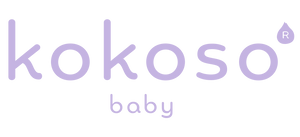
Ichthyosis in Babies - A Real Mum's Experience
Ichthyosis in babies
Ichthyosis is a group of rare skin conditions that cause dry, scaly skin. It's usually something you're born with, but it can happen later in life. According to the NHS, ichthyosis cannot usually be cured, but there are treatments to help the symptoms.
A real mum's experience
Mum Emily Whalley got in touch to share her experience of ichthyosis and how Kokoso products helped her baby's skin.
My Son Henry was born in June 2019 unexpectedly, 8 weeks early. It was obvious when he was born that there was a problem with his skin, he was whisked straight off to NICU and I was shown photos of him that my husband had taken, and I knew straight away that we were probably in for a long ride.
One in a million chance
We would not learn the extent of that until official genetic testing results came back when Henry was around 5 months old. Henry has Ichthyosis. There are numerous different types of Ichthyosis and to be born with it is incredibly rare. Henry had a 1 in a million chance of contracting it and his case is even more unusual as both me and my Husband passed on a faulty gene to him that we had no idea existed. Our eldest son was born healthy and well, so we never expected to be in a situation like the one we found ourselves in.
Henry had a long stay in the NICU and came home with paraffin, almost like Vaseline type consistency creams that smelt clinical and did not seem to help his skin recover but did a good job of protecting it.
How to care for baby ichthysosis
Henry will always have Ichthyosis and I spent the first 6 months of his life desperately researching the type Doctors suspected he had, and then later confirmed. I tracked down a specialist professor who had patients with Ichthyosis of Prematurity Syndrome and educated myself as much as I could about how to care for his skin.
His skin is thick and scaly and feels very dry, and although looks very normal now (he is almost 2), it was a long road to get here and now it is a case of taking each day as it comes and keeping his skin as moisturized as possible. Henry’s dermatology team have always said to just try different things and make sure they are 100% natural.
Kokoso Baby was a brand I knew about and I had tried so many different “natural” creams suitable for babies’ skin that I decided to do a bit of research into their products, straight away I was reassured that the coconut oil used in Kokoso’s products was natural, organic, and ethical and of course they have rave reviews!

Ichthyosis scalp care with coconut oil
I decided to trial the coconut oil for Henry’s scalp when he was nearly 8 months old, as this was the problem area, the scales on his head are plentiful and cause him a lot of discomfort. Within a few days, (although he had very greasy hair!), his scalp was less itchy and much more hydrated. That is when I ordered the rest of the skincare range, we now do not do a bath time without it!

Kokoso Baby skincare routine for ichthyosis
I put a few pumps of the hair and body wash into his water as it smells unreal! I cannot tell you how nice it is to have him smelling fresh and coconutty instead of the usual clinical creams, I then wash him head to toe with the hair and body wash and lather it up using the natural konjac sponge. The sponge is so satisfying to use! Instantly softens as it hits the water, Henry loves feeling and touching it too! After his bath I use the coconut oil to keep the moister in his skin and then once that’s sunk in I then apply the coconut baby lotion for extra moisture!

Kokoso were so kind when I told them how much they had helped Henry’s skin, they really are so passionate about what they do and how they can help baby’s like mine. Henry will always suffer a little with his skin but knowing I have found something that has worked for him has been such a game changers and just makes everyday life less stressful!

Huge thanks to Emily for sharing her story with us on our Mummy Blog. Emily is a qualified Gentle Sleep Consultant at Fox and The Moon Infant Sleep Services.


